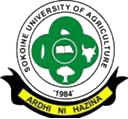Project Summary:
Funder: Google
Principle Investigator: Prof Mark M. Rweyemamu
Period:
Background
This proposal is being submitted against the backdrop that SACIDS is increasingly being readily accepted in the region as a pace setter in One Health issues.
Funder: Google
Principle Investigator: Prof Mark M. Rweyemamu
Period:
Background
This proposal is being submitted against the backdrop that SACIDS is increasingly being readily accepted in the region as a pace setter in One Health issues.
Goals
1. Consolidating the SACIDS Secretariat.
The main activity envisaged under this theme will be to consolidate the coordinating role of the Secretariat for the NatCIDS, developing linkages with similar networks in Africa and elsewhere, developing linkages with new partners both in industrialised and developing countries through the so-called South-South-North collaborations and continuing to serve as the platform for resource mobilisation.
While the salary component of several staff of the Secretariat will be met through other complementary grants from the Wellcome Trust and Rockefeller Foundation, the salary for the Executive Director for the 18 months will be funded solely through this Phase 2 proposal.
2. Support for the programme of the NatCIDS
At the national level the support to NatCIDS will target the following:
- Situation analysis of country disease surveillance programmes;
- Working toward wide stakeholder involvement with a view to improving national early warning and preparedness systems for epidemic infectious or emerging diseases;
- Expert participation in outbreak investigations;
- Convening scientific seminars for infectious disease surveillance and risk management strategies;
- Information sharing;
- Writing project proposals. NB: Already the Tanzania NatCIDS is submitting a project proposal to the national Science and Technology Commission for funding the Tanzania component of training in geospatial analysis under the technical back up of the regional SACIDS project component of the proposal that is hereby submitted to Google.org for Phase 2 SACIDS
3. Enhancing regional capacity for One Health geo-spatial analysis
There are 5 main considerations which justify a focus on geo-spatial analysis during Phase 2:
- Climate change has been identified by several international studies as a driver for infectious disease spread. Southern and East Africa experience outbreaks of climate dependent infectious and vector-borne diseases in either epidemic or endemic forms e.g. malaria, RVF, Tsetse and Trypanosomosis, TTBDs, plague, cholera. Climate change is also affecting land use and the spread of epidemic diseases such as foot-and-mouth disease which are not vector-borne. The spread and epidemiology of several of the diseases that are being targeted for surveillance and study (e.g. RVF, Plague, FMD) by the SACIDS consortium are being affected by climate change and land use.
- Within the Tanzania National Virtual Centre (i.e. consortium of institutions) for infectious Diseases, GIS and remote sensing expertise exist at SUA and the Institute for Resource Assessment of the University of Dar es Salaam (IRA-UDSM) but these tend to be primarily focused on agricultural and natural resource (forestry, woodlands, wildlife) land use than on ecology and epidemiology of infectious diseases;
- No specific GIS training module is included in medical and veterinary curricula at either undergraduate or postgraduate level;
- There is limited expertise in climate modelling in the region outside South Africa. The IRA-UDSM and SUA depend on models developed by Cape Town University, through a formal MoU;
- A demonstration of the mapping and geo-spatial analysis tools that are being developed by Google under the Google-earth, Google-maps and other initiatives, which was done by the Google.com team to the to the SACIDS Board clearly indicated an opportunity for accelerated introduction of Geographical Information Systems into disease and/or resource mapping and geospatial analysis of infectious disease events and distribution.
Focus
The focus for Phase 2 will involve the engagement by the SACIDS Secretariat of a postdoctoral research epidemiologist supported by ICT expertise. This team will collaborate with the GIS and Remote Sensing unit of SUA which is located within the same building as the SACIDS Secretariat plus the IRA-UDSM plus the epidemiology teams of UNZA, MUHAS and SUA.
Thus it will set up a GIS mapping and analysis facility at the SACIDS Secretariat in association with the SUA GIS and Remote Sensing Unit in order to enhance the capacity for geo-spatial analysis of infectious disease events using software/tools that are freely available plus conventional GIS and remote sensing tools.
This geo-informatics and climate study will use RVF as the platform for targeting work on GIS, remote sensing and climate modelling and through developing a training module in the three components run as short postgraduate CPD courses that eventually will be integrated into the SACIDS One Health MSc Epidemiology to be offered by University of Zambia (UNZA).
Project Members:






